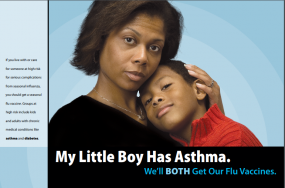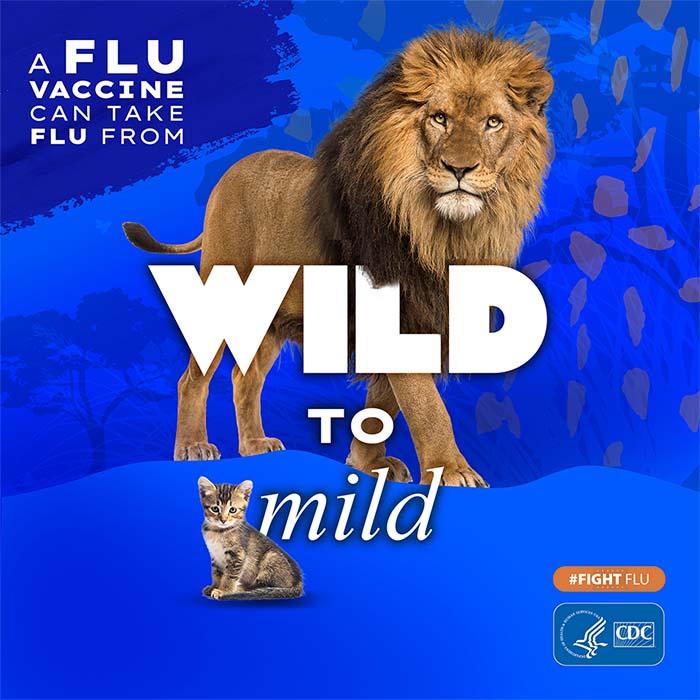Flu & People with Asthma

People with asthma are at higher risk of developing serious flu complications, even if their asthma is mild or their symptoms are well-controlled by medication. People with asthma can develop swollen and sensitive airways, and flu can cause further inflammation of the airways and lungs. Flu can trigger asthma attacks and cause worsening of asthma symptoms. Flu also can lead to pneumonia and other acute respiratory diseases. In fact, adults and children with asthma are more likely to develop pneumonia after getting sick with flu than people who do not have asthma. Asthma is the most common medical condition among children hospitalized with flu and one of the more common medical conditions among adults hospitalized with flu. More information about reported underlying health conditions among people hospitalized with flu is available from the FluView Interactive application.
About Asthma
Asthma is a lung disease that is caused by chronic inflammation (swelling) of the airways. It is one of the most common long-term diseases among children, but adults can have asthma, too. Asthma attacks occur when the lung airways become swollen and tighten due to airway inflammation. Asthma attacks can be caused by “triggers” such as respiratory infections, allergy particles, chemical irritants, and air pollution. During an asthma attack, a person with asthma can experience symptoms such as wheezing, breathlessness, chest tightness, and nighttime or early morning coughing. Often, asthma attacks can be prevented by limiting one’s exposure to triggers and by properly using asthma medications.
A Flu Shot is the Best Protection Against Flu
Flu vaccination is especially important for people with asthma because they are at higher risk of developing serious flu complications. Flu vaccines are reviewed each year and updated as needed to keep up with changing viruses. Also, protection from vaccination decreases over time, so annual flu vaccination is needed to ensure the best possible protection against flu. A flu vaccine protects against the three flu viruses that research indicates will be most common during the upcoming season. Flu vaccines have been updated for the 2024-2025 season. More information on why flu vaccines are updated annually is available at Vaccine Virus Selection.
Immunity from flu vaccination sets in after about two weeks after getting vaccinated. In addition to reducing risk of flu, flu vaccination has been shown to reduce severity of illness in people who get vaccinated but still get sick with flu:
- Flu vaccination has been shown to reduce the risk of getting sick with flu as well as reduce the risk of having a serious flu outcome like a stay in the hospital or even being admitted to the intensive care unit (ICU).
- More information is available at What are the benefits of flu vaccination? | CDC.
CDC recommends that everyone 6 months and older get a seasonal flu vaccine each year, ideally by the end of October.
Flu Vaccine Finder

Find flu vaccines in your area.
Everyone 6 months of age and older needs a flu vaccine.
Flu Vaccines for People with Asthma
- Most injectable influenza vaccines (or flu shots) are approved for use in people 6 months and older, regardless of whether or not they have asthma or other health conditions. Flu shots have a long-established safety record in people with asthma.
- People with asthma should generally not receive the nasal spray flu vaccine (i.e., the live attenuated influenza vaccine or LAIV).
- People with asthma who are aged 5 years and older, talk to your health care provider before getting the nasal spray vaccine.
- Children 2 to 4 years old who have asthma or who have had a history of wheezing in the past 12 months should not get the nasal spray vaccine.
Get pneumococcal vaccines.
- Pneumococcal pneumonia is an example of a serious flu-related complication that can cause death.
- People who have asthma should also be up to date with pneumococcal vaccination to protect against pneumococcal disease, such as pneumonia, meningitis, and bloodstream infections.
- You can get either Pneumococcal conjugate vaccine or Pneumococcal polysaccharide vaccine (but not both) when you get a flu vaccine.
- Talk to your health care provider to find out which pneumococcal vaccines are recommended for you.
Other Preventive Actions for People with Asthma
In addition to getting a flu vaccine, people with asthma should take the same everyday preventive actions CDC recommends for everyone, including avoiding people who are sick, covering coughs, and washing hands often. This also can include taking steps for cleaner air and hygiene practices like cleaning frequently touched surfaces. More information is available about core and additional prevention strategies.
Specific Health Actions for People with Asthma
- Take asthma medication exactly as your doctor or other medical professional tells you to do. Know how to use your asthma inhaler if your doctor of other medical professional tells you to use one.
- Plan ahead to maintain sufficient supplies of your regular medications for chronic medical conditions (e.g., at least a two-week supply).
- Know and avoid the asthma triggers that can cause you to have an asthma attack.
- Follow an updated, written Asthma Action Plan developed with your health care provider.
- Follow this Asthma Action Plan for daily treatment to control asthma long-term and to handle worsening asthma, or attacks.
- If your child has asthma, make sure that their up-to-date written Asthma Action Plan is on file at school and/or at the daycare center. Be sure that the plan and medication(s) are easy to get to when needed.
Symptoms and Treatment

Because you are at higher risk of developing serious flu complications, if you get sick with flu symptoms call your health care provider right away. There are antiviral drugs that can treat flu illness and prevent serious flu complications.
Flu symptoms include fever, cough, sore throat, runny or stuffy nose, body aches, headache, chills, and fatigue. Some people may also have vomiting and diarrhea, though this is more common in children than in adults People may be infected with flu and have respiratory symptoms without a fever.
- Influenza antiviral drugs are medicines that fight against flu by keeping flu viruses from making more viruses in your body.
- Antiviral drugs can make your flu illness milder and make you feel better faster. They may also prevent serious health problems that can result from flu illness.
- Treatment with an influenza antiviral drug should begin as soon as possible because these medications work best when started early (within 48 hours after symptoms start).
- You need a prescription from a health care provider for an influenza antiviral medication.
- There are four FDA-approved flu antiviral drugs recommended by CDC this season that can be used to treat the flu.
- People with asthma should not use the antiviral drug zanamivir (trade name Relenza®) because there is a risk it may cause wheezing in people with asthma or other lung problems.
When to Seek Emergency Medical Care
Anyone experiencing any of the following emergency warning signs of flu sickness, including people with asthma, should seek medical attention right away.
People experiencing these warning signs should obtain medical care right away.
In children
- Fast breathing or trouble breathing
- Bluish lips or face
- Ribs pulling in with each breath
- Chest pain
- Severe muscle pain (child refuses to walk)
- Dehydration (no urine for 8 hours, dry mouth, no tears when crying)
- Not alert or interacting when awake
- Seizures
- Fever above 104 degrees Fahrenheit that is not controlled by fever-reducing medicine
- In children younger than 12 weeks, any fever
- Fever or cough that improve but then return or worsen
- Worsening of chronic medical conditions
In adults
- Difficulty breathing or shortness of breath
- Persistent pain or pressure in the chest or abdomen
- Persistent dizziness, confusion, inability to arouse
- Seizures
- Not urinating
- Severe muscle pain
- Severe weakness or unsteadiness
- Fever or cough that improve but then return or worsen
- Worsening of chronic medical conditions
These lists are not all inclusive. Please consult your medical provider for any other symptom that is severe or concerning.
